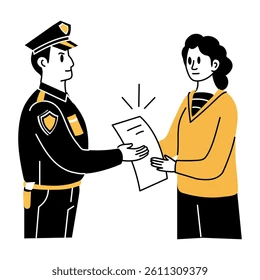
Author Introduction
My name is Haseeb Ahmed Khadim, and I’ve been actively involved in the field of law in Pakistan for over half a decade. Over the years, I’ve worked closely with individuals, legal institutions, and civil society to advocate for justice, simplify legal processes, and educate the public on their fundamental rights.
My work is rooted in the belief that law should be accessible to everyone, not just legal professionals. Whether it’s guiding families through succession matters or helping citizens understand their constitutional rights, I have always aimed to bridge the gap between complex legal systems and ordinary people.
Table of Contents
Introduction:
One of the most common legal challenges individuals face is not knowing how to report a crime or initiate legal action — especially when it comes to filing an FIR. That’s why I’ve authored a detailed, step-by-step guide to help you understand how to file an FIR in Pakistan, your rights in the process, and what to do if police refuse to cooperate.
In Pakistan the first step in any criminal investigation is the filing of the First Information Report (FIR). As sensitive as the issue of reporting and registering an FIR is in Pakistan the process is even more controversial. A variety of people either lack the relevant information to report a crime, fear to report a crime, or in reality have no intention of reporting it. The sole purpose of this article is to explore and enable citizens to understand the process confidently. This Article will be taking you through the process of How to File FIR.
✅ What is FIR?
FIR is an acronym of First Information Report, and it is a document and police prepares it after the information of a cognizable crime is reported to them. A cognizable crime is the more serious class of offenses including murder, robbery, assault, rape, theft, and even kidnapping, where the police have the authority to arrest the accused and commence an investigation without seeking approval from a court.
⚖️ Legal Basis for how to File FIR in Pakistan
First Information Reports of Cognizable Offences in Pakistan are governed, and their legal scope is derived from the Section 154 of the The Code of Criminal Procedure, 1898 (CrPC) in which it is stated that the police, upon receipt of information, shall record it as provided for in the section, and shall furnish a copy of the FIR without charge to the complainant.

📋 Under What Circumstances Can You Register an FIR?
An FIR can be filed when you’re the victim or when you can observe the below mentioned class of offenses:
- Homicide
- Rape or sexual assault
- Domestic violence
- Theft and burglary
- Kidnapping
- Acid Attacks
- Assault with Deadly Weapons
Police must first obtain permission from the court for non-cognizable offenses such as defamation, cheating, or verbal threats to begin any investigation.

🛠️ How to File an FIR in Pakistan, A Step-by-Step Process
Go to the Police Station knowing how to file FIR
- Visit the nearest police station (Thana) to where the incident happened.
- If the police station is too far, you may go to any police station and request redirection to your nearest station.
Information Submission
- Give a description of the incident, covering the details of the event, place, time, participants, and any possible witnesses.
- Bring any supporting documents or evidence such as photographs, videos, medical reports, and ID cards.
Statement Submission
- One may give his complaint verbally and let the police write it or he may submit a written complaint himself.
- Confirm his account correctly so the authorities can take appropriate action. He may ask to read the FIR before signing it to ensure its accuracy.
Issuance of FIR
•The officer in charge will enter the FIR details in the FIR Register and allocate an FIR number for the case.
•You will get a copy of the FIR for free.
Start the Investigation
- Following the filing of an FIR, the police have the authority to commence the investigation, which may in
- Going to the scene of the incident
- Interviewing the relevant individual
- Evidence gathering
- Detaining accused persons (if necessary)

🚨 How to Handle Situations When the Police Won’t File an FIR
Lets say for instance that the police do not file the FIR for you (which is illegal), you may:
1. Go to the Head Officer Directly
- Reach out to the local DSP or Superintendent of Police SP for assistance.
2. Write to the District Police Officer (DPO)
- Draft a detailed complaint with all the necessary information.
3. File a Complaint with the Court
- Under 22-A & 22-B CrPC, you have the right to petition the Sessions Court for an order to file an FIR.
4. Lodge an Online Complaint
- Use the police website of your province or the Pakistan Citizen Portal App to submit complaints online.
🌐 Useful links and resources
Here is the official portal where you can file complaints or learn more
• Pakistan Citizen Portal: citizenportal.gov.pk

📌 Suggestions to Help You Successfully File an FIR in Pakistan:
- Be polite and do not be aggressive while at the police station.
- It is smart to hold on to all relevant documents and keep a copy of the FIR.
- Anyone may report the matter through proper channels if a person is unlawfully detained or there is an unreasonable delay.
- A lawyer may also be consulted if a case is intricately detailed or of a sensitive nature.
🧑⚖️Know Your Rights
In Pakistan, every citizen has the legal and constitutional right to file a First Information Report (FIR) if a cognizable offense occurs. If this right is denied, it violates Article 9 (Security of person) and Article 4 (Right of individuals to be dealt with in accordance with law) of the Constitution of Pakistan, 1973.
✅Quick Summary
Filing an FIR shouldn’t be something to fear or feel overwhelmed by. When a person understands his legal rights and follows the right steps, he can help make sure that justice is served.
Whether you’re a victim or a witness, your involvement can not only help solve a crime but also prevent it from happening again.
So don’t hesitate or stay in the dark. Stand up, speak out, and use the law to protect yourself and others.
